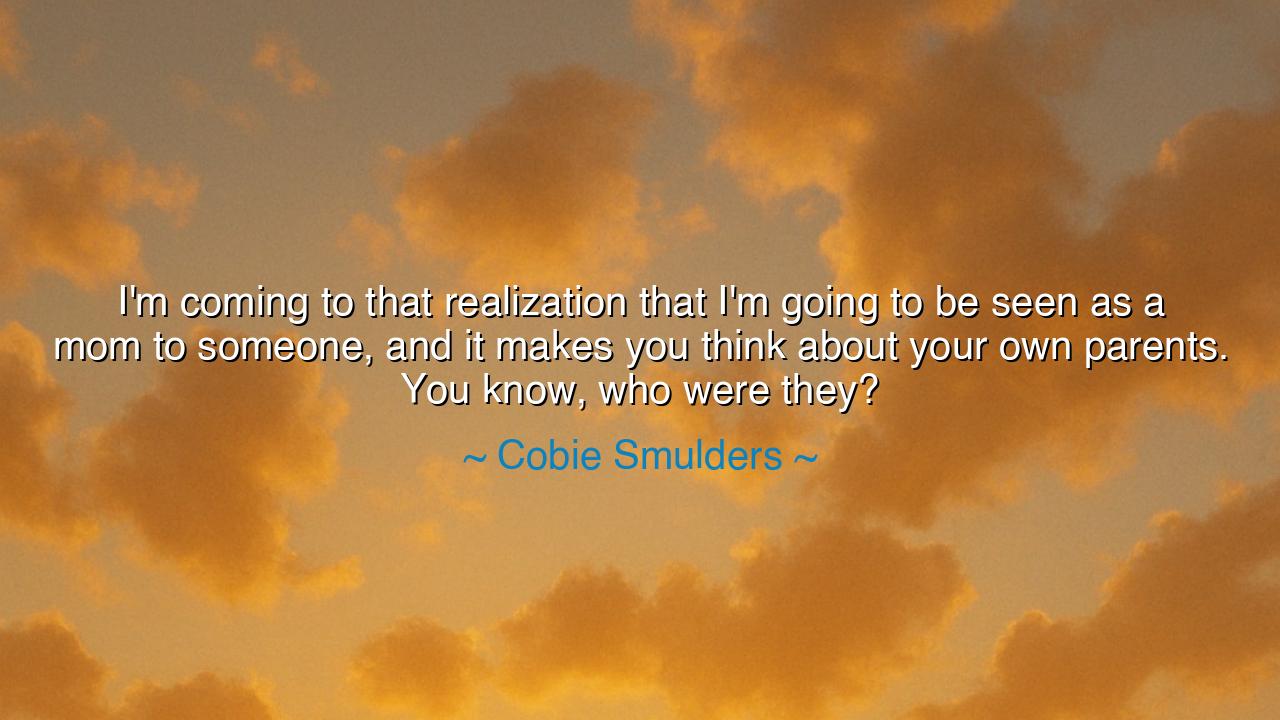
I'm coming to that realization that I'm going to be seen as a mom
I'm coming to that realization that I'm going to be seen as a mom to someone, and it makes you think about your own parents. You know, who were they?






When Cobie Smulders said, “I’m coming to that realization that I’m going to be seen as a mom to someone, and it makes you think about your own parents. You know, who were they?” she gave voice to one of life’s most sacred awakenings — the moment when a person stands on the threshold of parenthood and glimpses, for the first time, the mystery of continuity, of generations flowing one into another like rivers meeting the sea. In her reflection, there is awe, humility, and the quiet shock of understanding that one’s life is no longer a solitary journey but part of an unbroken lineage of love, labor, and sacrifice.
To become a parent is not merely to bring forth a child — it is to inherit a mirror of remembrance, one that suddenly reveals the depth of those who came before us. When Cobie speaks of thinking about her own parents, she touches on the eternal question that every generation must ask: Who were they before they became “Mom” and “Dad”? The title of parenthood, so revered and so consuming, often obscures the person behind it — the dreams they set aside, the fears they hid, the sacrifices they bore in silence. To realize that one day we too will be seen only through that same lens is to feel both the weight and the wonder of human inheritance.
In the ancient world, this moment of awakening was seen as the dawning of wisdom, the point at which selfhood expands to embrace the circle of time. The philosophers of Greece and the poets of the East alike taught that the soul matures not through age, but through empathy — the ability to see oneself in those who came before, and to see the ancestors not as distant figures, but as living echoes within us. Cobie’s realization is therefore not only maternal; it is philosophical. To become a mother is to step into the eternal pattern of creation, to understand that life is not made of beginnings and endings, but of continuations.
There is a story from history that reflects this truth: that of Queen Hatshepsut of ancient Egypt. Before she became a ruler, she was first a daughter — raised in the shadow of her father, Pharaoh Thutmose I. When she bore a child of her own, she wrote in her temple inscriptions of her wonder at the lineage she carried — that she was both the child of gods and the mother of kings. In her words, we see the same realization Cobie Smulders describes: that the cycle of parent and child is not one of hierarchy, but of reflection — each generation carrying forward the unspoken hopes of the last, while becoming the foundation for the next.
Cobie’s question — “Who were they?” — is not rhetorical. It is an invitation to look deeper into our origins. It calls upon us to see our parents not as figures of authority, but as human beings, once as uncertain and full of dreams as we are now. It urges compassion, for only when we see our parents as people do we forgive them their imperfections and honor their humanity. This is the cycle of understanding that binds all generations: first, we depend on our parents; then, we judge them; and finally, as we step into their role, we understand them.
There is also a quiet strength in Cobie’s words — the awareness of identity transforming. To be seen “as a mom to someone” means to surrender a part of one’s individuality, to let the world redefine you through the eyes of another. It is a noble surrender, one that mirrors the transformation of nature itself: the seed ceasing to be a seed so that the tree may live, the dawn giving up darkness so that light may fill the sky. In that surrender lies not loss, but transcendence — the realization that meaning grows only when we become part of something larger than ourselves.
The lesson here is profound and enduring: know where you come from, and honor the humanity that shaped you. When you become a parent, or a teacher, or any kind of guide, remember that you are stepping into a lineage of love older than history. Reflect on your own parents not with judgment, but with curiosity and gratitude. Ask who they were — not only for their sake, but for your own, for in knowing their story, you understand the roots of your own becoming.
Thus, Cobie Smulders’ reflection becomes not just a statement about motherhood, but a meditation on time itself. Every generation is both child and parent, both receiver and giver of life. To realize this is to awaken to the sacred continuum that binds us all — the eternal dance of identity and inheritance, where we are forever asking, “Who were they?” and in that question, discovering who we ourselves are meant to be.






AAdministratorAdministrator
Welcome, honored guests. Please leave a comment, we will respond soon